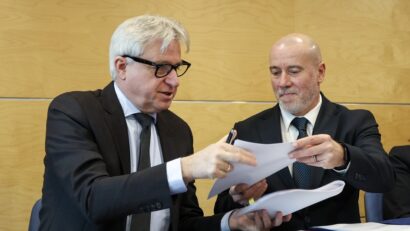The EU, between Brexit and refugee quotas
Britains leaving the EU and Hungarys referendum on immigration make the European Union go through the most serious crisis in its 50-year history, political analysts say.

Bogdan Matei, 03.10.2016, 13:41
Having become unavoidable after this summer’s
referendum, when Britons decided to leave the European Union, the split between
London and Brussels has already entered the procedural stage. British Prime
Minister Theresa May has confirmed she plans to start the process of
Britain’s withdrawal from the Union in six-months’ time that is in the spring
of 2017. Theresa May has also said that Britain will do its best to open a new
chapter in its relationship with Brussels as an independent, sovereign UK.
Almost immediately after the announcement, the European Commission put former
French prime minister and EU commissioner Michel Barnier, seen by the Brexit
supporters as a notorious anti-British, in charge of the EU’s Brexit
negotiations. For the time being, in spite of the European Commission’s
intention to make the split from Britain official as soon as possible, Barnier
has to wait.
For the UK
to leave the EU it has to invoke an agreement called Article 50 of the Lisbon Treaty, forged in 2009, which gives the two sides two years to
agree the terms of the split. According
to commentators, the new partnership between Brussels and London might take
Norway or Switzerland as a model, two countries that are in a de facto
symbiosis with the EU, without being among its members.
In the meantime, however, as a confirmation of what the
media dubbed as one of the most severe crisis in the EU history, Hungarians
overwhelmingly supported the government in a referendum on Sunday called to
oppose any mandatory European Union quotas for accepting relocated asylum seekers.
The good news for Brussels is, though, that the referendum failed due to low
turnout. Nevertheless, 98 percent of those who cast valid ballots backed the
government. The Radio Romania correspondent in Budapest quoted Hungarian PM
Viktor Orban as saying that nine out of ten participants in the ballot voted in
favour of Hungary’s right to take its own decisions in the matter. Although
some political analysts see the low voter turnout as a lesson taught to their
increasingly authoritarian prime minister, the Hungarians, Viktor Orban says,
must be proud to be the first in Europe to have a say on the matter. Orban went
on to say that in the following days he would present Parliament with a bill
for the revision of the Constitution, in keeping with the Hungarian citizens’
will, and that Brussels officials would have no choice but to take the
referendum into account.






























